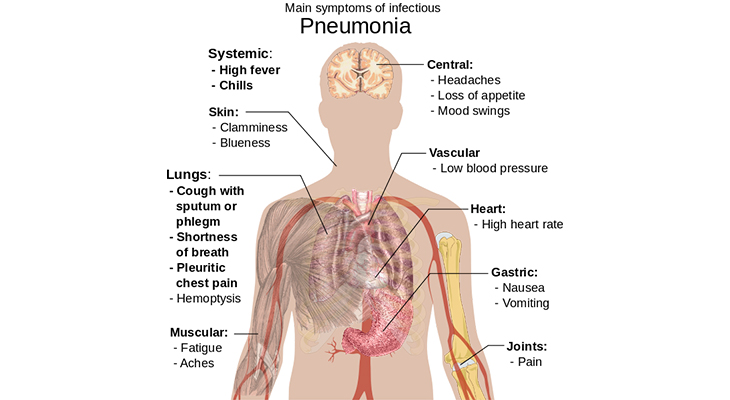Pneumonia: Symptoms and Risk Factors
November 12 is World Pneumonia Day
Pneumonia is a swelling or inflammation of one or both lungs, usually caused by an infection. This infection may cause the lung(s) to fill with fluid or pus and result in a cough (with phlegm/mucus or pus), fever, chills, and difficulty breathing. Pneumonia can be caused by germs such as air-borne bacteria (ie, Streptococcus pneumoniae) and viruses or fungi.
 (Infectious Pneumonia Infographic: Mikael Häggström, used with permission)
(Infectious Pneumonia Infographic: Mikael Häggström, used with permission)
Pneumonia can be a life-threatening illness and is a leading cause of death for seniors, older adults over the age of 65, people with chronic diseases, or weakened immune systems.
Symptoms of Pneumonia
Mild pneumonia symptoms are similar to a cold or flu, but are longer lasting. Seniors and the elderly may have lower than normal body temperature, or show signs of confusion or changes in mental awareness. Other common symptoms of pneumonia may include any or all of the following conditions:
- Shortness of breath
- Coughing which may include phlegm/mucus (yellow-green in color)
- Chest pain when breathing or coughing
- Fatigue, tiredness
- Fever, sweating and chills
- Nausea, vomiting, or diarrhoea
Pneumonia Risk Factors
You have an increased risk of developing pneumonia if you have/are exposed to these risk factors:
- Aging – People age 65 or older, seniors and the elderly (and children under age 2) are at the highest risk for developing pneumonia.
- Hospitalization – People who have had recent surgery, or are in the intensive care unit of a hospital, especially those on a ventilator; .
- Chronic diseases of the heart or lungs – People with asthma, COPD (chronic obstructive pulmonary disease), or heart disease.
- Smoking – Smoke damage the body’s defenses against bacteria and viruses that cause pneumonia.
- Weakened immune system – Suppressed or weakened immune systems due to use of long-term steroids, chemotherapy, organ transplants, or HIV/AIDS.
Pneumonia Prevention
You have a better chance of preventing pneumonia from developing if you:
- Stop smoking
- Wash your hands thoroughly and frequently
- Discard used kleenex/tissues
- Get the flu shot each year
- Avoid people who are sick, and don’t share their cups or eating utensils
- Get the pneumococcal shot if your doctor recommends it
When To See Your Doctor or Go to the Hospital
See your doctor promptly if you are over the age of 65, a senior, or have the other risk factors noted above, and your symptoms include any of the following:
- Difficulty breathing
- Chest pain
- Fever of 39C or 102F that doesn’t go away
- Cough that doesn’t go away (especially if you are coughing up pus)
Other Resources:
9 Health Conditions to Be Aware of at Age 50
*This article is for informational purposes only and is not intended as medical or mental health advice, nor is it a substitute for professional medical or mental health advice, diagnosis, or treatment. Always seek the advice of a qualified physician or mental health provider with any questions you may have regarding a medical or mental health condition. In the event of a medical emergency, call a doctor or 911 immediately. This website does not recommend or endorse any specific tests, physicians, products, procedures, opinions, or other information that may be mentioned on the Site. Reliance on any information provided by this website is solely at your own risk.*
